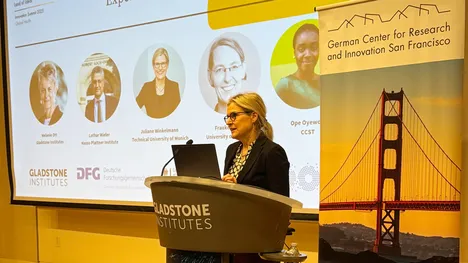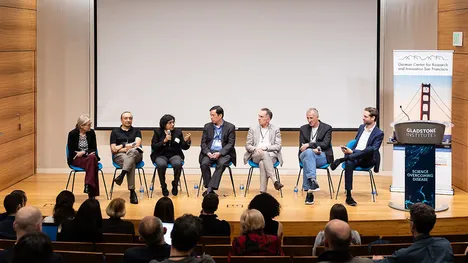Building bridges in health research: Prof. Winkelmann at the Innovation Summit in San Francisco
TUM Global, TUM San Francisco, News |

Alongside representatives from TUM, experts from the University of Cologne, Christian-Albrechts-University Kiel, and the Hasso Plattner Institute participated in the Innovation Summit organized by the German Center for Research and Innovation (DWIH). Researchers from the University of California, San Francisco (UCSF), Stanford University, the Chan Zuckerberg Initiative, the Gladstone Institutes, and the University of California, Berkeley were also present from the USA. Additionally, participants from the Life-Science startup scene of Silicon Valley attended.
Significance of the Innovation Summit for medical research
The Innovation Summit was a key event for medical research, as it promotes trust and internationalization – essential prerequisites for top scientists worldwide to collaborate, challenge each other, and develop innovative solutions. Of particular importance was the gathering of renowned researchers from Germany and the United States, which helped expand and strengthen international scientific relationships.
In her speech, Prof. Winkelmann addressed the relevance of these topics. As Senior Vice President for International Alliances and Alumni, she emphasized the significance of TUM's long-standing involvement in global research networks spanning Europe, Africa, the Middle East, as well as North and South America, China, and Southeast Asia.
Prof. Winkelmann’s keynote: Expanding genomic research worldwide

Her participation was also of great scientific significance. In her keynote address, where she spoke as the Chair of Human Genetics at TUM and Director of the Institute for Neurogenomics at the Helmholtz Center Munich, she emphasized the need to expand genomic research beyond Europe and North America. She made it clear how important it is to provide knowledge and healthcare tailored to the diverse needs of global populations.
Together with Prof. Winkelmann, several other renowned scientists participated in the event: Sharmilla Majumdar, Vice President for Research at UC San Francisco, Claus Glüer, Professor of Medical Physics at Christian-Albrechts-University Kiel, Ling Yu, Professor of Biomedical Data at Stanford University, and Matthias Haury, Acting Director of the Chan Zuckerberg Medical Imaging Institute. Bhupinder Bhullar, founder of Swiss Talk, was also present. They all took part in a discussion on the significance of data exchange in international medical research, moderated by TUM PhD student Paul Schmiedmayer from the Stanford Center for Biodesign.
Discussion on challenges in data management in research
The expert group discussed topics related to effective data management, the development of platforms for data exchange, the creation of policies that ensure privacy and cultural sensitivity, and how governments and the public can be engaged to build more trust in science. They identified the following key challenges that must be overcome to fully leverage the value of data and data exchange in medical research:
- The entire lifecycle of data management must be considered, including collection, storage, maintenance, curation, and processing. Every step in this process carries risks that can diminish the quality and value of the data.
- Lack of standardization makes data exchange, interoperability, and reproducibility difficult. This affects not only the data itself, but also the platforms for managing and processing data and the way people interact with the data.
- Infrastructure can limit research – storage requirements, processing speed, data exchange, and data interoperability all depend on high-quality, reliable infrastructure, which often lies outside the control of a lab.
- Insufficient policies and regulations regarding data exchange, data protection, and anonymization of data limit the scope and value of research and contribute to distrust in science and the value of data.
Recommended measures to improve data management
To address these challenges, the panelists recommended the following actions:
- Less bureaucracy
- Simple and clear standards for the entire data process, including federated learning.
- ore training to ensure data is used correctly and effectively.
- Provision of funding for international collaborations (more than two countries) and investments in essential infrastructure and open-source components to foster research, innovation, and reproducibility.
- Better communication and education in science to promote access to clinical data and build trust in research.
TUM as one of the leading institutions in medical research
The DWIH Innovation Summit demonstrated that TUM plays a leading role in medical research and technology. Through its global partnerships and collaboration with international experts, it makes significant contributions to achieving important scientific advancements. The event was a great opportunity to showcase TUM's commitment to science and celebrate the importance of science and international collaboration for global health.